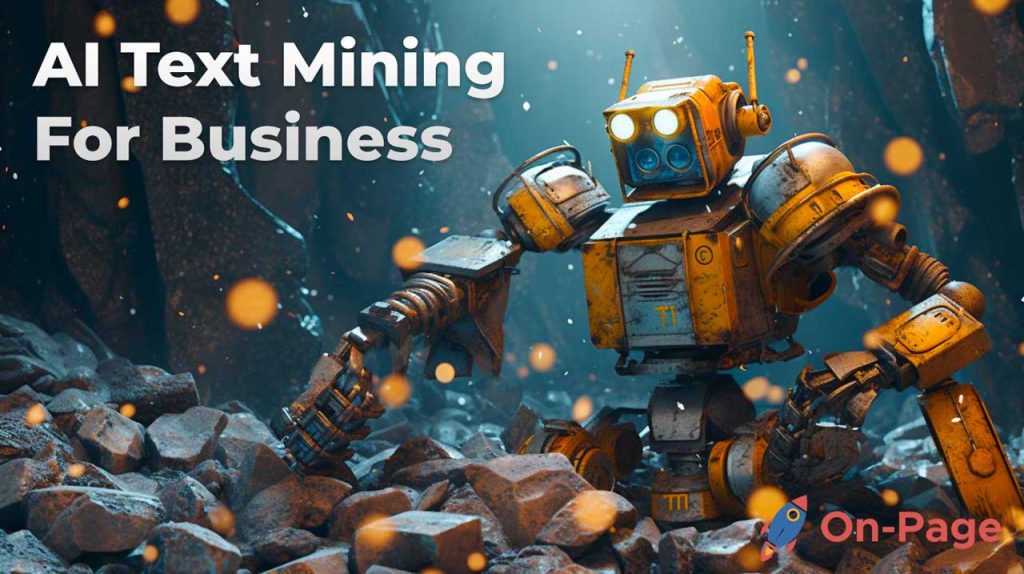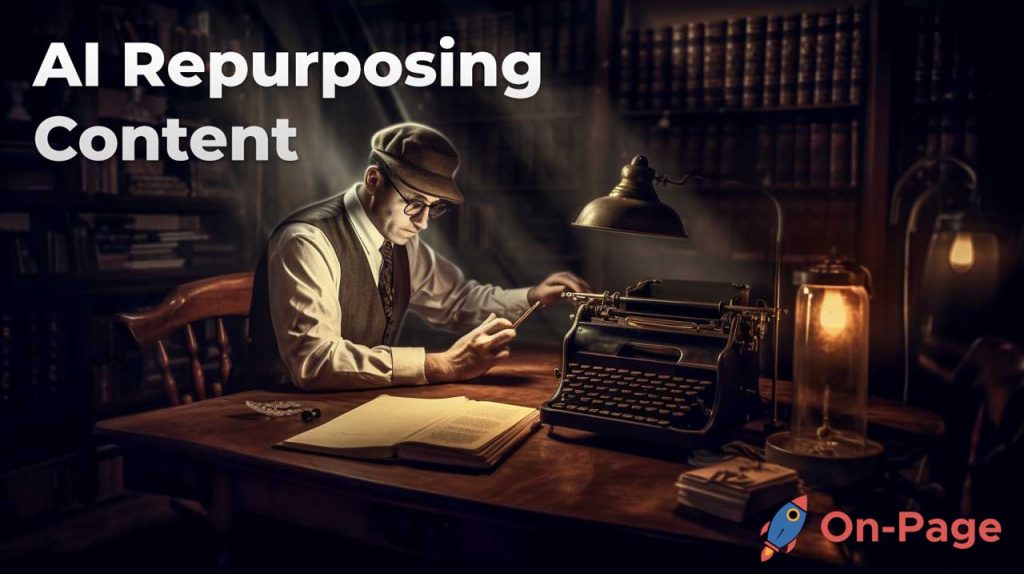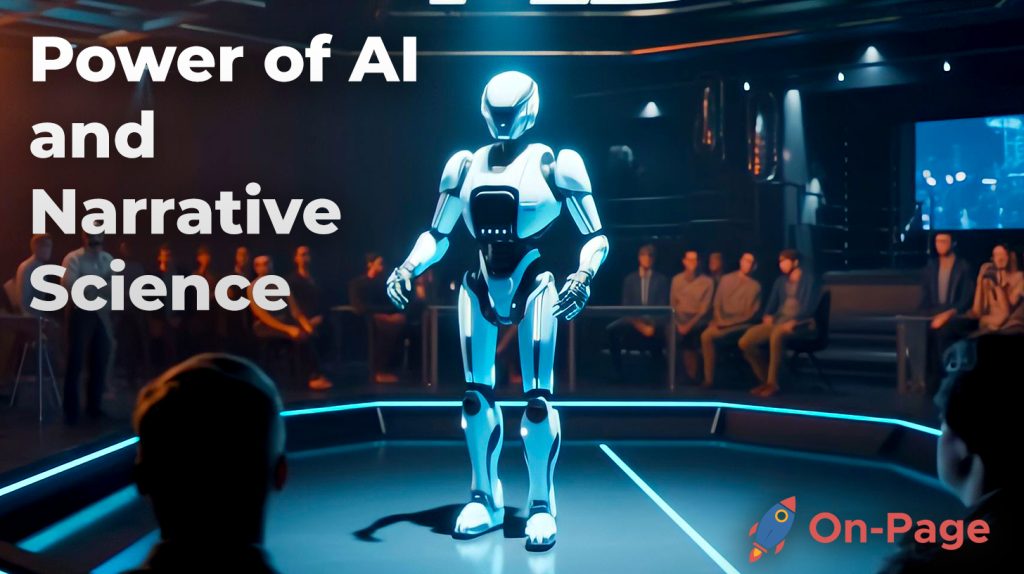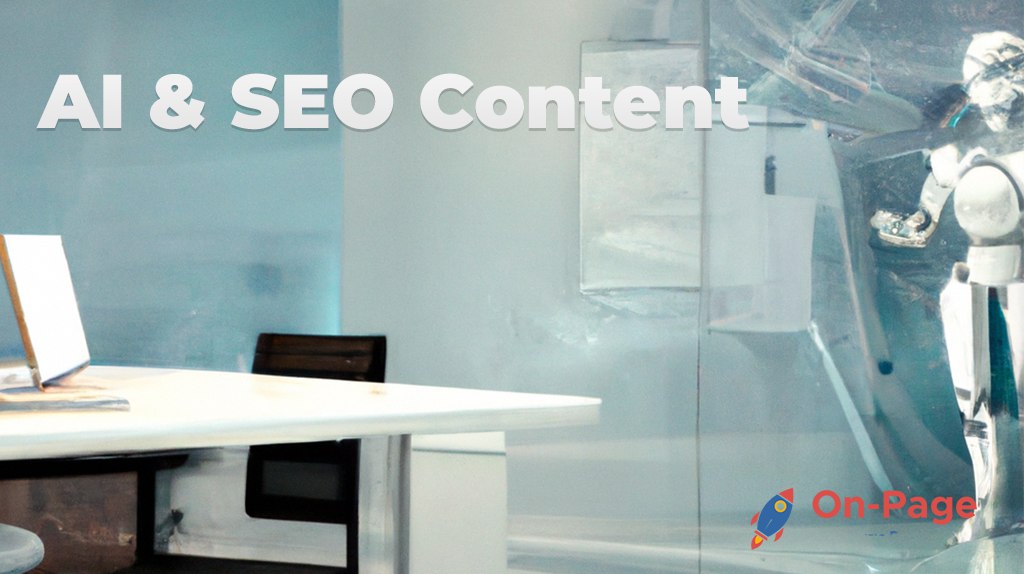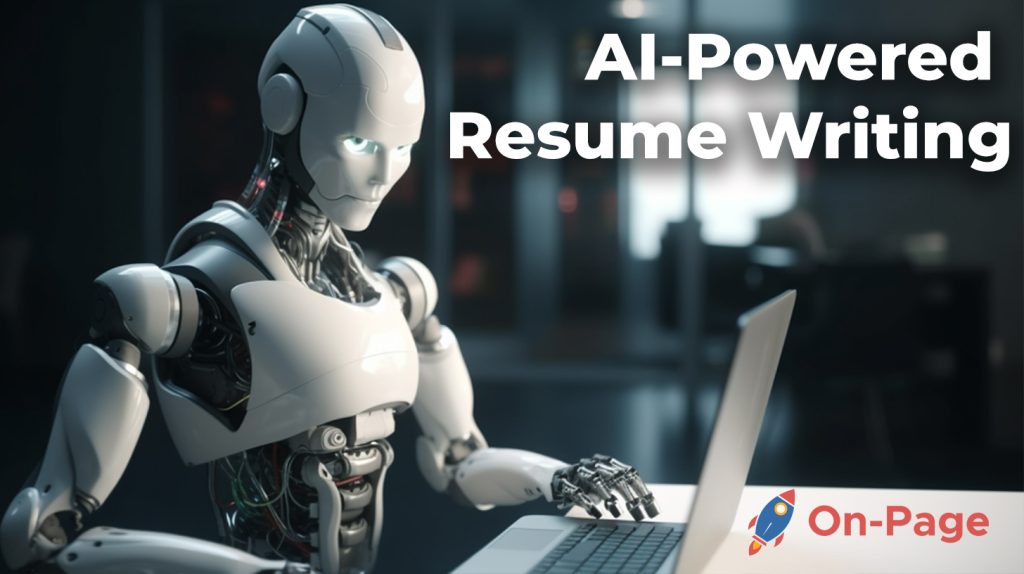
Imagine you’re strapped for time, staring down a deadline for your dream job application. You need to tailor your resume, making it stand out above the rest like a blazing neon sign. That’s where AI-powered resume writing comes into play, transforming the job search game into an experience unlike anything we’ve seen before.
If you’re eager to stay ahead of the curve and propel yourself into the future of job hunting, then buckle up, because we’re diving deep into the realms of artificial intelligence and its power to revolutionize the way you present yourself to potential employers.
AI-powered resume writing uses cutting-edge technology to analyze and optimize resumes for maximum impact. This includes identifying keywords that appeal to automated tracking systems, highlighting relevant skills and experiences, and even providing personalized feedback for improvement. By harnessing the power of AI, job seekers can craft more effective resumes and increase their chances of landing their dream job.
AI-Powered Resume Writing Tools
In recent years, AI technology has revolutionized the job search landscape. One of the most significant ways AI is changing the game is through AI-powered resume writing tools. These tools can analyze a user’s job history, skills, and qualifications to generate a professional and compelling resume in just minutes.
For instance, imagine you’re a recent graduate who just started searching for a job. With no experience and inadequate knowledge of how to write an impressive resume, you would probably spend hours researching and formatting your own CV. However, with the help of AI-powered resume writing tools, like those offered by Rezi, Resume.io, or other competitors, you could input all of your information and let the tool do the hard work for you.
The benefits are clear: AI-powered resume writing tools save time, eliminate mistakes and ultimately improve your chances of landing an interview. By identifying relevant keywords and including them throughout your resume, these tools can increase your chances of getting noticed by HR professionals.
However, some worry that relying on these tools too heavily will depersonalize resumes and make them all too similar. While it’s true that these tools offer standardized templates and phrasing options, remember that they don’t have to be followed exactly. Users can still customize their resumes based on their unique skills and experiences.
Think of AI-powered resume writing tools as an assistant who does the groundwork for you. Just like any assistant, they need guidance and direction from their user about what tasks need to be done. It’s up to you to provide context about your previous jobs, projects, or volunteer activities so the tool can help bring out your potential.
Overall, AI-powered resume writing tools have become increasingly popular for individuals seeking job opportunities. They offer an efficient way to create professional resumes quickly and eliminate mistakes. While they shouldn’t be relied on solely, these tools can be very helpful in streamlining the process of brand building for job seekers.
Rezi: An AI-driven Resume Builder
Among all the AI-powered resume writing tools available currently, Rezi stands out as one of the most promising solutions for job seekers. Rezi is an AI-driven resume builder that employs various machine natural language processing (NLP) algorithms to automate every aspect of creating a hirable resume.
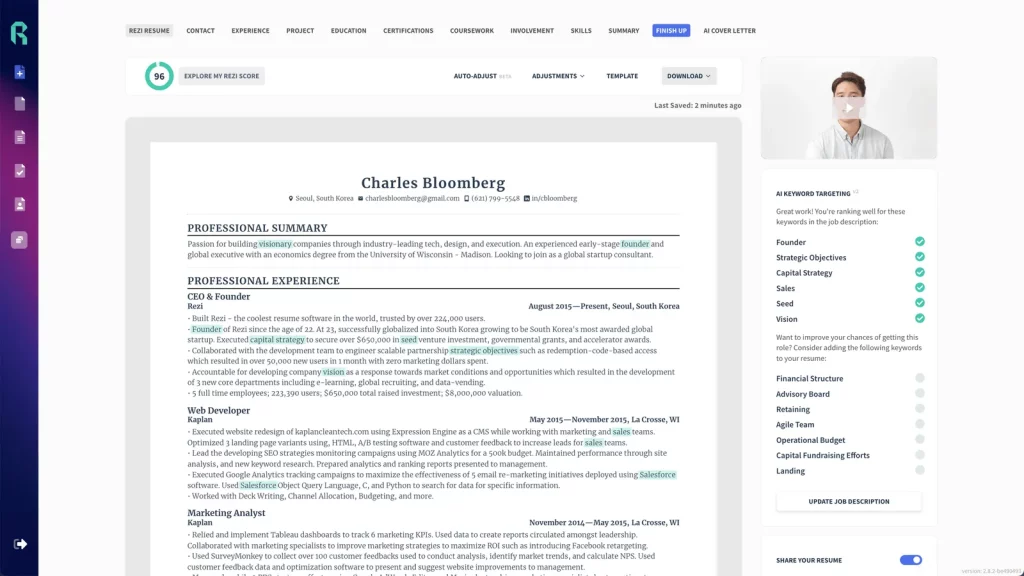
With its feature-rich environment, using Rezi’s platform feels no different from having a professional recruiter or career coach at your disposal 24/7. The user-friendly website provides users with an intuitive way to input their data and it processes everything for them in real time.
Rezi also offers some impressive features such as keyword targeting, content analysis based on real-time employer preference, and even blockchain verification services among others. This all-in-one package also includes helpful templates for cover letters and resignation letters, giving the user everything they need to present themselves professionally on paper.
Some critics argue that these features may make it too easy for candidates to create mass-produced resumes with cookie-cutter phrasing and a lack of unique perspective. However, such criticism is unfounded since Rezi empowers users to personalize their resumes by enabling them to control what they want in their CVs.
Using Rezi is like having a chatbot assistant who understands your personality and works with you to manifest your professional identity. Unlike ordinary chatbots though, Rezi uses advanced algorithms including machine learning to understand how candidate profiles should look like and suggests necessary modifications accordingly.
AI-assisted Writing and Optimization Features
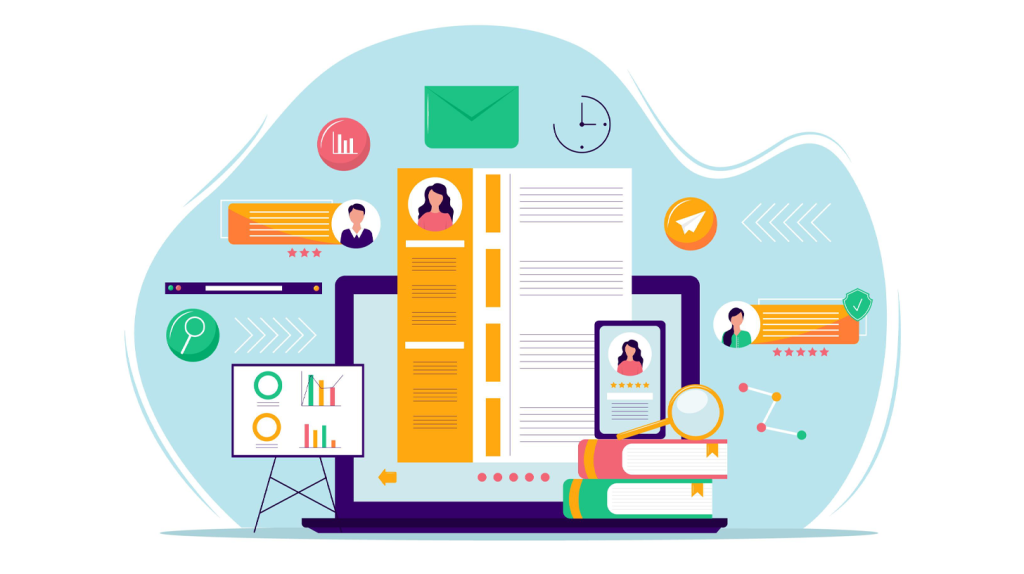
Artificial intelligence has transformed the way resumes are created. AI-powered resume builders provide a vast array of writing and optimization features that help candidates craft effective resumes. Resume builders like Rezi use machine learning algorithms to generate original content and optimize the final document for applicant tracking systems (ATS). Below are some of the AI-assisted writing and optimization features offered by these resume builders.
One example of an AI-enabled feature is automatic content generation. With this feature, the software generates new sentences and paragraphs for the candidate’s resume based on their experience and qualifications. This saves time for the candidate and provides them with a fresh perspective on their accomplishments that they may have overlooked. The algorithm also scans job postings to identify keywords that could enhance the candidate’s resume and increase their chances of getting hired.
AI-powered resume builders analyze the uses of passive and active voice to ensure that it is consistent throughout the document. A grammatically correct resume is crucial since it reflects well on the candidate’s communication skills. Misuse of language can dissuade potential employers from considering an otherwise qualified candidate.
However, some critics argue that AI-generated resumes are too formulaic and don’t adequately convey a person’s unique qualities. They claim that recruiters are more likely to be impressed by creative resumes highlighting individual accomplishments rather than those generated by algorithms which can lead to overlooking potentially strong candidates.
It is important to remember that while AI-generated resumes offer speed, consistency, and a personalized approach, they should ultimately be viewed as templates that need to be adjusted based on individual preferences.
Now let us consider how this technology benefits job seekers.
Advantages of AI in Resume Writing

AI-powered resume builders provide a range of advantages for job seekers. These benefits include increased efficiency, improved optimization, and better results. When used correctly, AI-powered resume builders can help job seekers significantly increase their chances of securing employment.
One major advantage of AI-powered resume builders is the ability to target specific keywords. These builders scan job postings and create resumes tailored for specific positions. This means that the candidate’s resume contains all relevant information and keywords to satisfy ATS requirements, increasing their chances of being selected by recruiters.
Another benefit is real-time analysis. AI technology analyzes the candidate’s writing style and helps them avoid grammatical errors and duplicate word usage. It also suggests alternate word options or phrasing that may be more effective. By doing so, the candidate can ensure that their resume accurately reflects their qualifications and accomplishments while appearing professional.
Furthermore, AI-powered resume builders offer a level of personalization that will make your resume stand out from other candidates’ resumes. They allow candidates to customize various elements, including formatting styles and sections, to suit their preferences or reflect their personalities.
Targeted Keywords and Real-time Analysis
One of the most significant advantages of AI-powered resume writing tools is their ability to offer targeted keyword suggestions and real-time analysis. The use of specific keywords relevant to the job position can make all the difference in whether a resume is shortlisted by an employer. These AI-driven tools are designed to scan through job postings and suggest the most suitable keywords for a particular role, making it easier for candidates to customize their resumes according to the position.
For instance, let’s say you’re applying for a digital marketing role, and you want your resume to stand out from the start. You can input the job description into an AI-powered resume builder tool like Rezi, which provides targeted keyword suggestions based on current industry trends. It can analyze your resume alongside your target job description and offer suggestions for each section, including work experience, education, and skills.
With such tools assisting them in building their resumes, applicants can rest easy knowing that they are beating ATS which eliminates 75% of resumes before they reach a human recruiter. The algorithmic analysis offered by these tools ensures that resumes contain the most relevant information required by employers.
A study shows that using ATS-optimized keywords increases your chance of getting your resume selected by almost 70%. That is why AI-powered resume builders remain so popular with job seekers due to this feature. The suggested terms help identify necessary industry terms and jargon while also showing recruiters that you have specific skills and experiences tested in other related positions.
The impact of this capability does not stop there. These cutting-edge software programs will inform applicants of overused words or phrases common to their profession, allowing them to make changes and avoid using cliches repeatedly.
These tools provide savvy candidates with real-time suggestions as they write their resumes. Most words won’t get flagged until after you’ve finished writing, but AI-powered builders like Rezi offer real-time suggestions as you fill out your information.
While there are numerous benefits to using AI-powered resume writing tools, some job seekers worry that they risk having their resume reduced to a pile of keywords, effectively diminishing personality and creativity in the process. So finding the right balance between AI suggestions and individualization remains vital.
Balancing AI and Human Inputs

The truth is that machines are far better than humans at sifting through massive amounts of data quickly and providing pinpointed recommendations within seconds. However, when it comes to creating an effective resume that expresses professional achievements and unique skills that set you apart from other applicants, personal input is crucial.
Ideally, an applicant should use AI-powered builders as a starting point in creating an effective resume before customizing it with their personal input. They can incorporate relevant accomplishments that demonstrate their ability to excel in specific roles where such unique situation-driven experiences showcase their strength. This will show recruiters that the applicant has put effort into tailoring the application materials for this specific opening, demonstrating a willingness to exceed normal standards.
Think of the relationship between an AI-powered tool and the user as one between a GPS navigation system and a driver. The GPS helps direct the driver where to go by offering suggestions on which route to take based on current traffic conditions and other relevant factors while still allowing for human decision-making when turning left or right according to individual preferences or knowledge of local routes. Likewise, while AI-driven resume building takes care of identifying necessary data points through analysis, human intuition must always play a critical role when making decisions about what information is relevant or noteworthy.
Using expert review services can also help job seekers strike a balance between technology-generated reviews and the human touch. Moving beyond tools that provide templates and keyword-based recommendations, online platforms such as TopResume and Kickresume offer a human-centric approach to editing resumes through access to career coaches and experienced editors who provide personalized feedback on content, layout, and formatting.
All that being said, anyone who hasn’t updated their resume in a while can attest to how big of an undertaking it can be. Balancing the time overhead it takes to craft a custom-written resume against taking advantage of advanced AI career technologies is still up for debate. Job seekers ought to know these tools only suggest certain stylistic approaches are not writing the whole document for them.
Though advancements in resume writing software have made initial job applications more accessible than ever, the importance of balancing individual creativity and expertise with technological guidance should never be forgotten.
Like baking a cake, which requires one to follow specified instructions carefully using the right ingredients but allows room for personal touch based on experience improved over several tries, a perfect resume equally blends both applications of technology and human inputs.
Ultimately, candidates benefit from finding the right balance between AI recommendations and personalized inputs since it’s easy for algorithms to compare resumes side-by-side, whereas human recruiters seek out individual stories that differentiate each applicant from others on paper.
Expert Reviews and Personalization
AI-powered resume builders can make a tremendous difference in how job seekers prepare for interviews thanks to their ability to analyze a resume’s skillset and deliver tangible results like interview rates. However, many job seekers may struggle with doubts when they realize that AI is a central role in the process — specifically the fear that the software will not adequately reflect their creativity or personality, or convey any objective details they wish to include from their careers, such as past accomplishments they are particularly proud of.
Fortunately, though these tools can generate resumes in just a few minutes by extracting data from online platforms like LinkedIn or personal websites, they also offer expert reviews and personalization services. By combining both man-made expertise and AI power, users have access to well-rounded results that speak to their specific needs, goals, and career path.
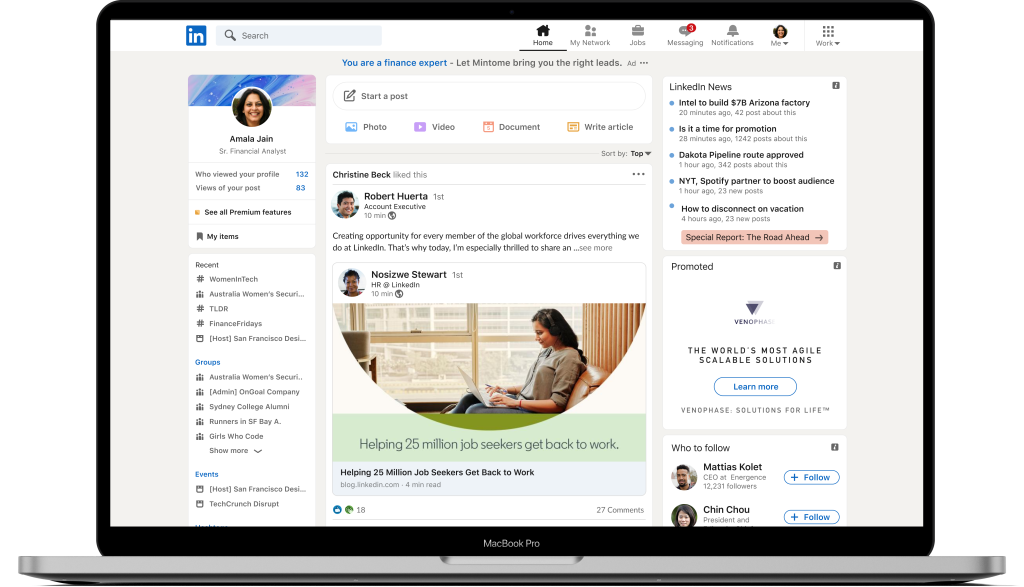
To illustrate further, consider Rezi’s Expert Review option, one of its most sought-after features. While the vast majority of HR personnel may take as little as six seconds to decide whether or not to pursue an applicant’s candidacy based on their resume, Rezi consultants provide thorough reviews that address several key issues spanning document structure:
- Layout
- A proper balance between hard (quantitative) and soft (qualitative) skills
- Language use
- Achievements
- Clarity in expressing both experience and job target aspirations
These reviews are based on years of experience in proscribing top-notch resumes across multiple industry fields. They represent a crucial differentiator that sets applicants apart from the thousands of other candidates vying for the same position.
Additionally, AI-powered resume makers understand that job-seeking is ultimately about personalization. To win people over albeit through algorithms, these automated platforms offer customization options that let users leverage nuanced variations reflective of different professional aspirations. For example — depending on whether one is eyeing an internship or senior-level executive position — utilizing targeted keywords and phrases for approaching accomplishments can set resumes apart from competing candidates even better.
Finally, think of personalized reviews much like working with a personal trainer. Just as it takes time to build up strength and endurance, rewriting one’s career history in a way that captures their interests and achievements can be a painstaking effort worth outsourcing to an expert concerned with optimizing results. What better partner than an artificial intelligence-driven service that is also equipped with meticulous detail-focused oversight?
AI’s Impact on the Job Search Landscape

In addition to providing much-needed structure and accountability in resume preparation, AI-powered tools are also fundamentally changing the recruitment landscape for hiring authorities. With advanced algorithms capable of pinpointing additional details on candidate information that may not be immediately available for review, the interview process can take on a whole new level of insightfulness.
One influential example of this is found in video job interviews enabled by artificial intelligence services like HireVue, which offer high-level insights around cognitive analysis during recorded candidate interviews. In essence, these software products analyze each applicant’s digital body language: facial expressions, voice tone, and pace as well as the quality of responses. Based on collected data exceeding 25,000 different points per second, employers gain insights into each individual’s core values, adaptability to multiple situations, and levels of motivation in real time — attributes difficult, if not impossible, to authenticate through resume/application materials alone.
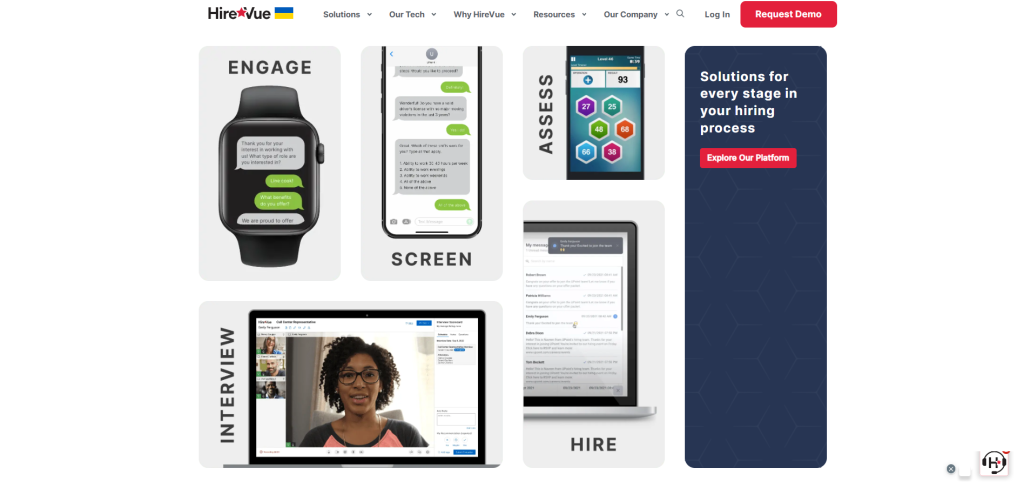
To balance potential benefits against concerns regarding the fairness of such cutting-edge applications, HireVue and similar providers have committed to racial equity measures like staggering technical demands based on particular jobs available. Any criterion used for hiring must meet legal standards pertaining to the position being offered. This ensures that candidates from all groups receive the same opportunities if they perform well during screenings as it includes reviewing more contextual data around specific applicants, including their schools’ demographics.
With professional AI tools in place, the odds become more even across the board. Hiring managers gain a bird’s-eye view that goes beyond mere keywords, and over time, they can become much better at identifying diamonds in the rough. Job seekers, on the other hand, no longer have to “connect the dots” — they have tools that can help them immediately articulate match readiness and personal brand based on individual career goals.
Ultimately, the landscape of candidate recruitment has never been less predictable. Like all tides rising with increased technological innovation, the greatest challenge facing both sides will be how best to navigate unfamiliar seas where machine and human coordination is foundational to success. With AI-powered tools like Rezi and HireVue in place, job seeking and talent acquisition may just generate waves of opportunity where long-term value is derived from strategy rather than chance.
AI and Resumes in Numbers
- According to a study conducted by Jobvite in 2020, approximately 35% of recruiters use AI-powered tools to help screen and review resumes, highlighting the increasing importance of AI in the job search process.
- A survey conducted by TopResume in 2021 revealed that 65% of job seekers who used AI-based resume builders felt their final resume was more effective than the ones they had written themselves.
- Research from Kelton Global in 2019 indicated that recruiters typically spend an average of just 7.4 seconds reviewing a resume, emphasizing the importance of AI-assisted optimization to help resumes stand out and make an immediate impact on potential employers.
AI’s reach toward different industries is undeniable. SEO content optimization tools like On-Page.ai and resume writers like Rezi continue to provide the boost needed for finishing complex tasks more efficiently.
Frequently Asked Questions
1. How accurate and effective is an AI-generated resume compared to one written by a human?
AI-generated resumes are becoming increasingly accurate and effective compared to those written by humans. Studies have shown that AI-powered resume writing tools can significantly increase the chances of getting a job interview.
For instance, according to a report by TopResume, the use of their AI-powered resume review tool, which analyzes resumes based on keywords and industry-specific requirements, led to a 68% increase in interview requests among users.
AI-powered resume-writing platforms like Resume Builder and CV Compiler offer job seekers the ability to tailor their resumes to specific job postings, using NLP algorithms that identify relevant skills and experiences from a user’s career history.
However, it’s important to note that AI-generated resumes are not without limitations. They may lack the human touch, creativity, and personalization that some employers value in traditional resumes. It’s wise for job seekers to work with both AI-powered and human experts in crafting their resumes for optimal results.
Overall, while an AI-generated resume may not completely replace a human-written one, it can certainly serve as a valuable tool in helping job seekers stand out in today’s competitive job market.
2. What challenges do job seekers face when submitting AI-generated resumes to recruiters?
Job seekers using AI-generated resumes face several challenges when submitting their applications to recruiters.
- First, automated resume builders may not be able to capture the applicant’s personality and strengths as effectively as a human-written resume would. This can result in a lack of personalization in the document, which is crucial for making a strong impression on recruiters.
- Next, there still exist biases inherent within AI systems that could lead to possible discrimination against candidates. For instance, an algorithm might choose to downgrade applicants based on their gender or race subconsciously. A 2019 study by the National Bureau of Economic Research found that machine learning algorithms used in hiring produced discriminatory results against women and non-white candidates.
- Furthermore, some recruiters may not even be open to receiving AI-generated resumes as they may perceive them as generic and less reliable than those written by humans. According to an article by Forbes, only 38% of employers are currently using AI tools for recruitment purposes.
- Lastly, one significant challenge is the need for job seekers to understand how to optimize their AI-generated resumes successfully. With a larger proportion of companies beginning to use software that scans through resumes for keywords relevant to the position applied for, it becomes vital for applicants to know what words and phrases will rank well in these analyses.
In summary, while AI-based resume writing tools present great advantages such as speeding up the job application process, job seekers need to consider its limitations and focus on optimizing personalized resumes uniquely suited to their intended audience.
3. What specific AI technologies and tools are used in resume writing?
In the modern age, AI is revolutionizing almost every sector of life, and resume writing has not been left behind. With AI-powered tools and technologies, job seekers can now have a competitive edge in their job searches. Some of the specific AI technologies and tools used in resume writing include NLP, machine learning, and resume parsing.
NLP utilizes algorithms to analyze written or spoken language to extract meaning from words, phrases, and sentences. In resume writing, NLP can help identify keywords that are required or preferred by employers in their job postings. According to a study by Jobscan, an AI-powered software company, 98% of Fortune 500 companies use ATS which rely on NLP algorithms to scan resumes.
Machine learning algorithms enable computers to learn without being explicitly programmed by using data to train models. In resume writing, machine learning can analyze candidates’ resumes and compare them with successful past resumes to make suggestions for improvements. This allows job seekers to be proactive in tailoring their resumes for specific job postings instead of relying on generic templates.
Resume parsing involves the extraction of important data from resumes such as contact information, education history, work experience, and skills. AI-based parsers can extract this information more accurately than humans, providing concise summaries and easily scannable profiles.
Overall, these AI-powered technologies aid in creating personalized resumes that match specific job requirements while also increasing efficiency in the hiring process. As the employment industry continues to evolve with technology, it’s essential for job seekers to adapt and utilize these tools to improve their chances of securing opportunities.
4. Can AI help identify bias in resumes or improve diversity in hiring?
Yes, AI can help identify bias in resumes and improve diversity in hiring. The traditional resume screening processes can be time-consuming, prone to human error, and often biased, causing certain candidates to be overlooked or rejected due to their gender, race, or ethnicity.
AI-based resume screening tools use algorithms to analyze job applications from various angles such as qualifications, skills, experience, and personality traits, without any personal biases. These tools eliminate human bias by scanning the resumes of all applicants objectively and identifying qualified candidates based on merit.
According to a survey conducted by LinkedIn Talent Solutions (2021), organizations that used AI-based recruitment tools saw a significant improvement in diversity hiring. The study found that 71% of companies using AI in hiring experienced an increase in diverse employees’ hiring rates. Similarly, a report from Accenture found that AI can help remove bias in recruitment by up to 55%.
In conclusion, AI is revolutionizing the job search game by providing more objective analysis of resumes helping employers select the best-fit candidates for their organization. By leveraging AI, companies can reduce recruitment bias and improve diversity hiring outcomes. It’s high time for employers to embrace these technologies to attract top talent from all backgrounds.
5. What potential ethical concerns arise from using AI in the hiring process?
The use of AI in the hiring process certainly has its benefits, but it also raises some ethical concerns. One major concern is the potential for bias in AI algorithms. Studies have shown that certain AI algorithms can perpetuate racial, gender, and socioeconomic biases, leading to unfair hiring practices.
In addition, there is a risk of data privacy violations if AI systems are not properly secured. These systems may collect and store massive amounts of personal information about job candidates, which could be vulnerable to hacking or misuse.
The use of AI in hiring could lead to the dehumanization of job applicants, with employers placing too much weight on quantifiable data and metrics rather than human qualities such as personality and interpersonal skills.
As the use of AI in hiring becomes more widespread, it is important for companies to prioritize ethical considerations and ensure that their systems are transparent and fair. In particular, regular audits should be conducted to identify and mitigate any biases in the data or algorithms used by these systems.
References:
- Friedler S. A., Scheidegger C. E., Venkatasubramanian S., Choudhary S., Hamilton E. P., & Roth D. (2019). A comparative study of fairness-enhancing interventions in machine learning. Proceedings of the Conference on Fairness, Accountability, and Transparency.
- Taylor L., & Floridi L. (2021). The ethics of artificial intelligence: Issues and initiatives. Philosophy & Technology, 34(4), 563-589.
Curious about how AI can help you write? Sign up to On-Page.ai and start your content optimization journey today.

